Emma Caldwell murder: Family's anger at police as killer Iain Packer is jailed
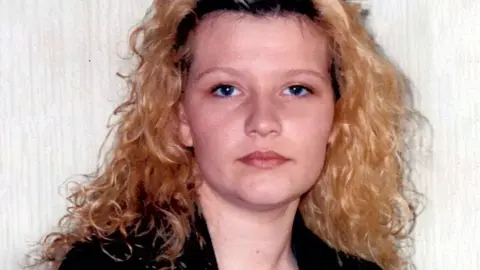 BBC
BBCIain Packer has been jailed for at least 36 years for the murder of Emma Caldwell in remote woods 19 years ago.
The 27-year-old's death in April 2005 had been one of Scotland's most high-profile unsolved murders.
Police have apologised for how the original inquiry was handled and for letting down Emma and other victims.
Emma's family said she had been failed by police due to a "toxic culture of misogyny and corruption" which left Packer free to rape other women.
The Scottish government said it would consider holding a public inquiry into what went wrong with the original investigation.
The 51-year-old was found guilty of Emma's murder and 32 other charges including 11 rapes and multiple sexual assaults against a total of 22 women.
Packer was found guilty of attempting to defeat the ends of justice by dumping her body in Limefield Woods, South Lanarkshire, and disposing of her belongings, and of indecently assaulting her.
Emma's body was found in the woods in May 2005, five weeks after the sex worker was last seen in Glasgow city centre.
Packer was cleared of a further three charges - one indecent assault and two sexual assaults - against a further three women, after the jury returned not proven verdicts.
The sentence is the second longest ever handed down by a Scottish court, behind the 37 year minimum jail term given to World's End killer Angus Sinclair in 2014.
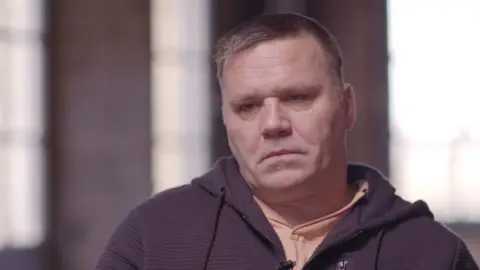
Packer remained impassive in the dock at the High Court in Glasgow as the verdicts were delivered by the jury.
In the public gallery, Emma's mother Margaret Caldwell, 76, wept and was comforted by relatives as her daughter's killer was finally brought to justice.
Mrs Caldwell told BBC Scotland News she could "breathe again" now that Packer had been found guilty.
She added: "When they found Emma's body, and they came in and told me they had found her body, I just took this huge breath in and now I feel as if I can let it out.
"I can breathe again and go on. She will always be in our thoughts. She will always be there. She will always be my Emma."
The family's lawyer, Aamer Anwar, described Packer as being "one of the UK's worst sex offenders" and called for a "robust" judge-led public inquiry into the original police investigation, adding that some officers had "blood on their hands".
Four Turkish men were initially charged with Emma's murder in 2007 before the case against them collapsed the following year.
Mr Anwar added: "A toxic culture of misogyny and corruption meant the police failed so many women and girls who came forward to speak up against Packer.
"Instead of receiving justice and compassion, they were humiliated, dismissed and in some instances arrested, while the police gifted freedom to an evil predator to rape and rape again."
During sentencing, Judge Lord Beckett said Packer "pursued a campaign of violence and appalling sexual mistreatment of a very large number of women".
The judge added: "You have caused great harm to so many people as you indulged your pathologically selfish and brutal sexual desires."
He added that Packer preyed on the vulnerable and caused "extreme and enduring suffering for so many women and their families".
The judge told the killer: "You murdered a capable and compassionate, intelligent young woman who had planned to extricate herself from the difficult life she had been living".
Lord Beckett continued: "Emma was alone, in the dark, deprived of her phone and miles from any prospect of help".
The judge said Emma was taken from her family at a time when she was trying to take steps to change her life adding she was killed in "truly terrifying circumstances".
Lord Beckett added: "For years you lied time and again before you were undone by your arrogance in thinking that you were in the clear and entitled to compensation from the police who had investigated you."
He thanked the jurors, who took four days to reach their verdicts, for their "extraordinary service" during the six-week trial and excused them all from jury service for life.
During the trial, the jury was taken to Limefield Woods, where Emma's body was found, to allow them to see the remote location for themselves.
Emma had been living in a hostel in Glasgow at the time she went missing.
She had left home after becoming addicted to heroin and began working as a prostitute to fund her habit.
Her mother, Margaret Caldwell, told the trial that she last saw her daughter when she dropped her off at the hostel on Sunday 3 April 2005.
She and her late husband, William, searched for Emma for weeks after she went missing.
Packer, who was 32 at the time, had driven Emma to the remote forest near Biggar, where he strangled her and disposed of her naked body.
A major murder inquiry was launched after Emma's body was discovered by a dog walker the following month.
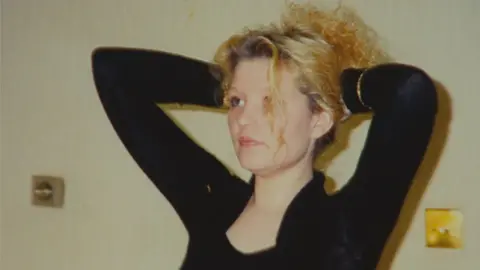
Over the next two years police took hundreds of statements as they investigated the murder.
Her picture was projected onto a derelict block of flats in Glasgow and a reconstruction featured on the BBC's Crimewatch programme.
The police investigation originally focused on a Turkish café in the city which was known to be frequented by a number of sex workers.
A small blood stain from Emma was found on a duvet, and in 2007 the four Turkish men were charged with her murder.
However, the case against them collapsed after it emerged that conversations which were recorded during a covert police surveillance operation had either been taken out of context or translated incorrectly.
Police Scotland has apologised for how the original inquiry was handled by what was then Strathclyde Police.
"Emma Caldwell, her family and many other victims, were let down by policing in 2005. For that we are sorry," the force said.
"A significant number of women and girls who showed remarkable courage to speak up at that time also did not get the justice and support they needed and deserved from Strathclyde Police."
The Scottish government said it was right that Police Scotland had apologised, and that it would consider holding a public inquiry into what went wrong. First Minister Humza Yousaf plans to meet Emma's family soon.
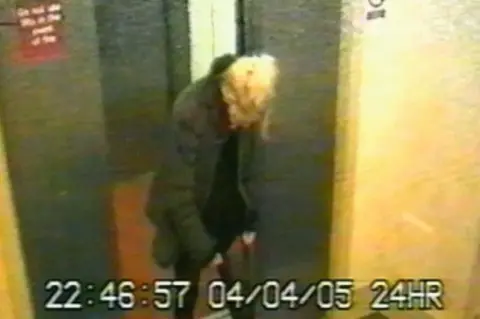
Several women had previously raised concerns about Packer, a man who regularly paid sex workers and had a reputation for being aggressive.
He started having sex with prostitutes when he was 18 and would drive to an area known as "the drag" looking to pick women up as often as he could afford. This was how he first met Emma.
He was said to be infatuated by the 27-year-old and would drive around looking for her and scaring off other potential clients.
He picked up Emma on more than one occasion and took her to Limefield Woods once or twice.
In 2004, Packer indecently assaulted Emma in the city's Barrowlands area.
He told police differing versions of how he knew Emma over the course of six different interviews following her murder.
At one point he led officers directly to the wood where Emma's body had been found.
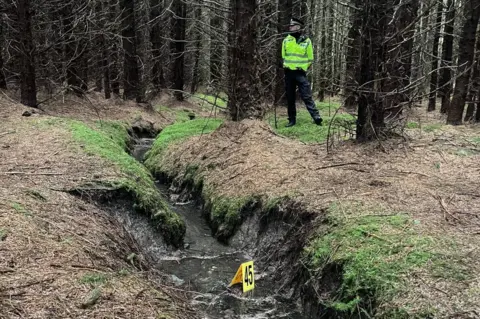
However, former detectives involved in the inquiry have told BBC Scotland News that senior officers told them not to pursue Packer as a suspect.
Instead, they focused on the Turkish men who were initially believed to have killed Emma.
After the collapse of the case against the four Turkish men, the murder case went cold until the lord advocate ordered police to re-open the investigation in 2015.
That same year, the Sunday Mail newspaper named former sign fitter Packer as a "forgotten suspect" in the murder inquiry.
In 2018, he contacted the BBC asking to tell his side of the story in an attempt to clear his name.
He was interviewed twice by journalist Sam Poling, whose documentary Who Killed Emma? was broadcast the following year.
One of Packer's former partners told the murder trial that he was "white as a sheet" after the second interview.
"You could see something had gone badly wrong. It was as if it was all closing in on him," she said.
Just hours after the documentary was broadcast, she contacted police and told them she had been stalked and attacked by Packer.
He was arrested and jailed for two years in February 2020 after pleading guilty.
In February 2022, Packer was arrested and charged with Emma's murder. He stood trial two years later, accused of dozens of charges of physical and sexual violence against women.
Police Scotland said it had been the "courage, resilience and determination shown by Emma's family, in particular her parents William and Margaret, and all those who survived Iain Packer's horrific catalogue of offending that got us to where we are today".
The force described Packer as "a calculating sexual predator who targeted women over many years" and said the re-investigation of the case had been the largest police inquiry of recent times in Scotland.
Packer had denied all the charges - accusing all the women of lying - but admitted during his evidence that he indecently assaulted Emma Caldwell.

You can watch Catching a Killer: The Murder of Emma Caldwell on iPlayer now. It will be shown on BBC Scotland on Wednesday at 21:00 and later on BBC Two at 23:15.


You can listen to the podcast series Who Killed Emma? on BBC Sounds.


One of the most harrowing moments of this trial was the testimony of a young woman who Iain Packer raped 11 years after he murdered Emma Caldwell.
Through floods of tears, she described a traumatic sexual assault which would not have happened had he been convicted of killing Emma following the original police inquiry.
She wasn't alone. Packer committed sexual offences against at least 10 women after he left Emma's naked body in woods in South Lanarkshire.
In the coming weeks, the lawyer representing Emma's family plans to take them to see the head of Scotland's prosecution service, the chief constable of Police Scotland and First Minister Humza Yousaf.
Aamer Anwar argues that only a fully independent public inquiry can properly scrutinise the past actions of police and prosecutors.
Legal sources with knowledge of the case support the view of former detectives who believe there was enough evidence for Packer to have been charged by 2007, two years after the murder.
Instead, inexplicably, the full headlights of the original inquiry were never turned in his direction, even when charges against four Turkish men collapsed.
That must rank as one of the most serious failures in the history of Scottish policing.
Clearly, we'll never know if Packer would have been found guilty had the case gone to trial years ago.
He had taken great care to cover his tracks and much of the evidence that was used against him in 2024 wasn't available back then.
Over the course of 19 years, the inquiry into Emma Caldwell's murder analysed more pieces of information than the investigation into the Lockerbie bombing.
Modern forensic techniques were deployed, more victims came forward after a BBC investigation into the case in 2019, and the police tracked down people like the young woman he attacked in 2016.
But if Packer had been convicted in 2007 or 2008, it would have spared Emma's family years of torment and prevented more women from falling prey to Scotland's most prolific sex offender.
